I Am Hutterite: 5-book giveaway and interview with Mary-Ann Kirkby
Mary-Ann Kirkby was raised on a Hutterite colony in Manitoba.
When Mary-Ann was 9, her family–parents, herself, and six siblings–left the colony for the world.
I Am Hutterite is Mary-Ann’s memoir of life at Fairholme Colony, and her adjustment to living “outside the ark”.
The Hutterites
Hutterites are spiritual cousins of the Amish. The two groups share roots in the European Anabaptist movement. The Amish, named for leader Jakob Ammann, came about in 1693 as a result of schism within the Mennonite churches. Hutterites originated much earlier (1528), and take their name from early leader Jakob Hutter. Amish and Hutterites share values such as non-resistance, adult baptism, and plain lifestyle.
Unlike Amish society, however, Hutterite life is based in shared possessions. A key scriptural passage for Hutterites is Acts 2:44-45: “And all that believed were together, and had all things in common, and sold their possessions and goods, and parted them to all men, as every man has need.” A Hutterite individual may own a small trunk containing a few personal items. Otherwise all resources are shared; members renounce all claims to colony goods upon baptism.
Hutterites live in colonies numbering anywhere from 70 to over 200 members, with 90-150 more common. While Amish live among non-Amish, Hutterites are physically segregated from the world on the colony. When a colony reaches a certain size, it divides, with half its members founding a daughter colony in a new location. A colony typically supports itself through large-scale agricultural operations comprising thousands of acres.
Male leaders are elected to important colony positions. The colony boss and senior minister, responsible for the colony’s financial management and spiritual life, are the most important. Other positions include field boss, German teacher, assistant minister, and cow man. Females are also chosen for important positions, such as head of kindergarten, head cook, and gardener.
Hutterites make use of modern technology, including automobiles, electricity, computers, and mechanized farm equipment. Hutterites are noted for their distinctive plain clothing. Clothing style varies among the main Hutterite groups (Dariusleut, Lehrerleut, and 2 Schmiedeleut groups), which themselves vary in degree of conservatism.
Hutterites number about 49,000 today. They live on approximately 480 colonies, mainly in the Canadian provinces of Alberta, Manitoba, and Saskatchewan, as well as Montana, South Dakota and a few other states (for more, see Concise Encyclopedia of Amish, Brethren, Hutterites, and Mennonites).
How to win a copy of I Am Hutterite
Thomas Nelson has provided 5 copies of I Am Hutterite for today’s contest. There are 2 ways to enter:
1) Leave a comment on this post (1 entry)
2) “Like” the Amish America page on Facebook (1 bonus entry).
On the Facebook page, you’ll find extra articles, photos, and comments on the Amish. You can find the “like” button in the right sidebar.
The contest runs until next Monday, January 17th. I will draw 5 winners at random from the comments and Facebook “likes”, and post them that day.
Below, Mary-Ann has kindly answered some questions about Hutterite life.
An interview with I Am Hutterite author Mary-Ann Kirkby
Amish America: In I Am Hutterite, you describe how over the years you have encountered “harsh and misinformed opinions” of Hutterites. What are some of those misconceptions?
Mary-Ann Kirkby: Most misconceptions are borne out of ignorance. I don’t think there is any other culture in North America that so many know so little about as the Hutterites. Some people just don’t like the way we dress or feel threatened by our lifestyle. It can be as small as that but that’s enough to create a barrier. Over the years, Hutterites have been accused of not paying taxes when in fact we pay corporate tax.

Our lack of involvement in events of the towns and villages that surround us has caused some unkind words and accusations and our stance on pacifism is often met with hostility. Our strengths such as the fact that we don’t use the welfare system or social assistance and we take care of our elderly at home rather than place them in nursing homes is entirely overlooked.
When your parents decide to leave Fairholme colony, it is a very traumatic event, not only for you but for loved ones you left behind. How often do individuals leave Hutterite colonies? Do individuals or families often return? What is required for reconciliation?
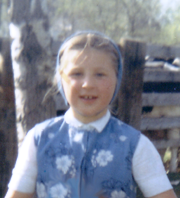
Mary-Ann Kirkby: In 1969 when my family left it was almost unheard of for an entire family to do this. Young people have always left and just as often returned. Lately however the exodus is far higher. The computer age is having a global impact on our societies and the Hutterites are feeling it too. Our youth are more aware of events in the world at large and they want to experience it like everyone else.
However the transition to mainstream society is still a huge obstacle so our return rate remains fairly strong as well. For an non-baptized member to return, one must close all bank accounts, sell all possessions and give those to the community. On many colonies single men and women are now also required to undergo AIDS testing before being accepted back.
A baptized member goes through a more rigorous process because he or she has essentially broken their vows and must be admonished and repent of this error in judgment.
What aspects of Hutterite life have you missed the most? Has that changed over time?
Mary-Ann Kirkby: Most of all the people, their saucy sense of humour, their endearing and unmistakable candor and the wonderful camaraderie. I miss eating my favorites foods, including cottage cheese and sucre pies on a regular basis and for my son Levi, I miss the privilege of having friends and family right next door and running with them all day in such a safe community environment.
What don’t you miss about Hutterite life?
Mary-Ann Kirkby: Getting up really early and my cook week. I would however really enjoy my bake week. The warmth and smells of the bakery, watching the dough rise, kneading it and rolling the buns is an altogether sensuous experience.
At the beginning of I Am Hutterite, you describe the importance of Acts 2:44-45. In your experience, how well does having all things in common work?
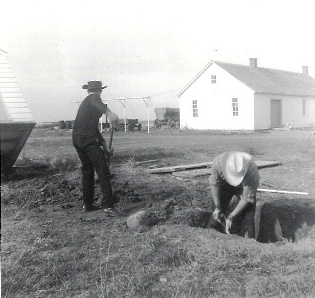
Mary-Ann Kirkby: When the leadership on a Hutterite Colony (the Predigar) really loves his flock and does his utmost to abide by spiritual principles, treats everyone fairly and with respect it is a wonderful (not perfect) but truly fulfilling way to live. Regrettably there are some Colonies with a great deal of conflict and variations of conflict and challenges in all communities. How they are dealt with determines the degree of happiness of the people.
Reading your book you really get a sense of how collective an endeavor Hutterite life is, for example regarding raising children. Can you share a little on Hutterite thinking on teaching and disciplining youth?
Mary-Ann Kirkby: Hutterite children are adored and raising them is really very natural and collective although there is never any doubt that the mother has primary say. There are important rites of passage that every child undergoes.
I have just released my new children’s book, Make A Rabbit which you can see on my website www.polkadotpress.ca. It deals with potty training, which we view as children’s first rite of passage. The next will come at age six when early childhood is over and the more formal training begins. They now begin to attend church and commence English and German school. The next stage is at age 15 when they officially become adults. These are all very special stepping stones in the Hutterite culture.
In I Am Hutterite you describe how it can be difficult for colony members to acquire transportation, that permission must be granted by the head of the colony to leave with a colony vehicle.
But there are other occasions, such as when your non-Hutterite Uncle Pete comes to discreetly sell the colony ladies cosmetics, or the numerous times when you returned to Fairholme after your family left Hutterite life behind, or when colony members visit relatives in other colonies. How strictly is traffic regulated into and out of the colony?
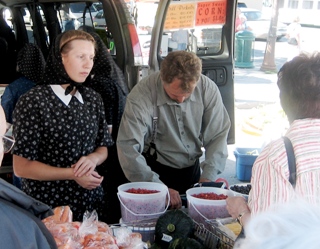
Mary-Ann Kirkby: Quite frankly no one is supposed to leave the colony grounds without permission or instructions to do so. The minister and farm boss have special dispensation but regular community members don’t just up and go somewhere because the keys to the vehicles must be signed out and reason given, whether it be business, doctors’ appointments, or visitation. As for coming on to the Colony that is a bit more difficult to regulate. Hutterites by nature are quite friendly and social and alot of the traffic is people coming to buy produce so it would be quite easy for Uncle Pete to sneak in to do a little commerce.
Food seems to play an important role in Hutterite life. Can you share about eating customs and typical foods?
Mary-Ann Kirkby: A Hutterite kitchen…really is a thing of beauty. Newborns eat at home with their mothers, young children from the age of 2.5 to 6 years eat in the Kleineschul (kindergarten), from 6-15 we eat in the Essenschul (children’s dining room) ,and from 15 to old age we eat in the Essenstuben, the adult dining room. The minister, the sick, elderly and infants eat at home.
The kitchen bell will ring 6 times a day. It will ring once 15 minutes prior to every meal (first call) to announce that the food is ready for all those who are eating in their own homes. And then it will ring on the hour for the rest of the community.
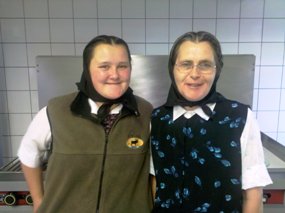
The cook is one of the highest positions to which a woman can aspire and for the most part her appointment is based on skill. She will be given a hand written recipe book from the previous cook which has been handed down and no doubt will have flour and grease marks on it. Many of the recipes will be centuries old, originating with our earliest ancestors and Europe. At Christmas we serve duck with cabbage in cream sauce. Yummmmmmmmmmmmmmmm.
Our foods are fresh and wholesome. Our recipes are hundreds of years old. Where do I begin to explain how sinfully delicious and satisfying cottage cheese pie and Maultoschen are? You will simply have to wait for my recipe book Secrets of a Hutterite Kitchen that I am presently writing.
Alcohol also seems to play a role in social life. For example when you describe how the senior minister sends a bottle of rye whiskey for the Hulba, or when your Father shares dandelion wine to celebrate your birth. How is alcohol perceived, and how common are alcohol problems?
Mary-Ann Kirkby: Jesus drank wine and so do we. Certainly alcoholism exists but is not a serious problem perhaps because it is more easily monitored on a Hutterite Colony. Moderation is strongly stressed and alcohol is served mostly at weddings or celebrations. We don’t serve it at daily meal times.
Your book is titled I Am Hutterite, but do you still “feel Hutterite”? What do you tell your children about their heritage?
Mary-Ann Kirkby: Of course I do….in every way. I still speak the Hutterisch language fluently. I visit often, sing our songs, know our stories and from time to time even wear the clothes. They are my people and there is no other culture on earth that I belong to more. My soul has a Hutterite heartbeat. My son Levi is my only child and I always take him with me to the colony. He loves it there and the kids adore him.
—
Bonus: This classic documentary film about the Hutterites offers a look at Hutterite life in the 1960s.
Photo credits: Manitoba colony-Presley Perswain; new colony 1960s-Eternal Vagabond; Saskatachewan market-Peter Merholz; Hutterite women Montana-Matt Green


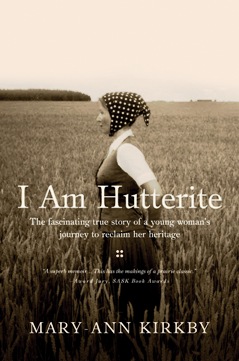


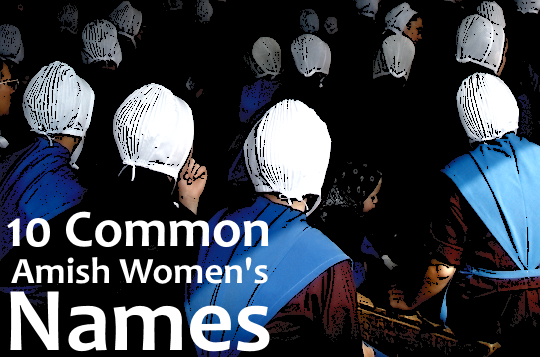

Lake effect in Amish Ohio
Glad to hear it Alice. Don’t forget to make a snowman. Richard you too. Snow is a treat for some, a headache for others. In NC growing up, it was a treat. 2 inches, and school’s out folks. And it was lots of fun.
But of course once you head north, both frequency and tolerance for the stuff goes up. I wonder if we could figure out a ‘snow love’ line on a US map, corresponding to how positive public opinion is to the stuff.
I think responses would start to get more negative than positive once you hit northern OH/PA. And definitely the “lake effect” zone must be sick of it. I remember getting caught in a storm in Geauga County one year, definitely in the “lake effect” zone. I ended up having to spend the night in my truck. One to remember!
What an interesting book. I would very much like to read this lady’s testimonial on her life as a Hutterite. God Bless, Granny Sandy
Would enjoy reading this book.It sound very interesting. Thanks for the giveaway.
Another great book giveaway! My uncle gets turkeys from the Hutterites in Montana.
I haven’t heard of this book before, but it sounds fascinating!
This book sounds interesting, would love to read it.
i have enjoyed reading about the Hutterites and how they are different from the OOA
Sounds like a very interesting book.
Would love to beable to read it. And
duck with cabbage in cream sauce it
sounds delicious
I own “I Am Hutterite” and very thoroughly enjoy it. After I read it the first time I’ve gone back and read it again occasionaly. I read everything I can lay my hands on regarding Anabaptist ways and variations. Mary-Ann Kirkby breathes life into her book and the little known Hutterite culture. I would love to someday eat the strawberries she speaks of so highly, preferably fresh picked and warm from the sun! Thanks for such a lovely book.
This would be a great book to read.
They seem to be very interesting.
Sure, you betcha
I get a charge out of Ms. Kirkby’s supposed willingness to be labeled a Hutterite now that she can write and profit from it.
She might let the whole earth know her father was not a Hutterite but he married a Hutter girl and they actually were part of a group that left the Hutterites and formed their own communal group. The book makes it sound like they left the colony and were on their own when the truth is, the “colony” they left wasn’t even a Hutterite colony nor were they on their own. There were other families who left the cult like group they belonged to at the same time.
To my knowledge she was so young when they left I don’t know how she would have had a “cook week” to miss or not miss.
Her book amounts to expoitation of the Hutterites the same as many exploit the Amish for profit.
One of the best books I have ever read.Wished I had a chance to visit a Hutterite colony like this,sometime.
I hope for a book!
Id love to read this, thanks so much.
Sincerely
Andy White